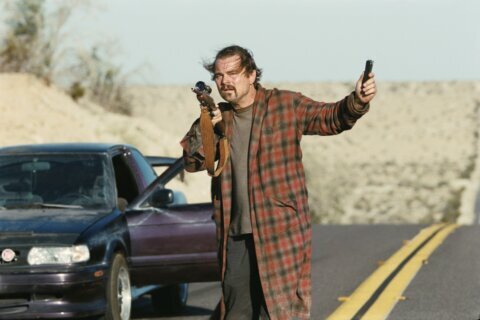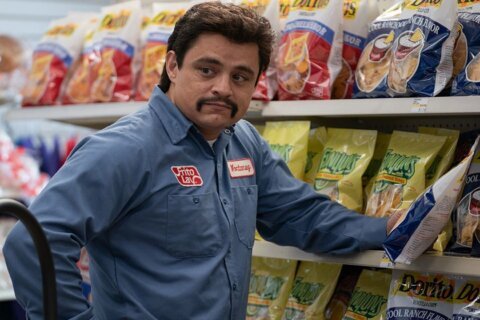WASHINGTON – It’s Ethan Hawke Week here at WTOP.
Okay, so maybe he doesn’t quite have the clout to deserve an entire week.
But the 42-year-old actor does have a pair of vastly different movies in theaters this weekend, both foreshadowing 2022.
One is a futuristic thriller that hits multiplexes nationwide Friday.
The other is a romantic drama three-quel already in limited release, but with unlimited insight into the human condition.
In the world of good news and bad news, sometimes it’s best to hear the bad news first.
So let’s “purge” out the negativity, “before” ending with my favorite movie so far this summer.
Yeah, it’s that good.
![]()
‘The Purge’
“The Purge” is the No. 1 movie Fandango fans want to see this weekend, due to its fascinating high-concept premise: what would happen if all crime were legalized for one night a year?
James DeMonaco’s script poses that in the year 2022, the United States has been taken over by a corporate group known as the “New Founding Fathers of America,” who have lowered unemployment to 1 percent and reduced crime to an all-time low. They’ve achieved this “progress” with an annual 12-hour event known as “The Purge,” a period of population control where the immoral hold murderous “Purge Parties” and the moral go into hiding in locked-down homes.
James Sandin (Ethan Hawke) has made a fortune selling home security systems to suburban neighborhoods. His wife Mary (Lena Headey) tries to comfort her pale son Charlie (Max Burkholder), who steers a camera-fitted doll on a remote-control car, and their beautiful daughter Zoey (Adelaide Kane), who dates an older boy (Tony Oller) against her father’s wishes.
Just minutes after the father punches in the security password on their home, young Charlie notices a homeless man (Edwin Hodge) screaming for help outside. He temporarily disarms the security system, allowing the man inside, a display of compassion that draws the family into the cross-hairs of a band of mask-wearing killers. The ringleader (Rhys Wakefield) gives James an ultimatum: either release the homeless man to be killed, or they’ll raid the house and kill everyone.
By its very nature, the premise is a unique sociological experiment, criticizing survivalist attitudes while posing murderous moral dilemmas. Racial attitudes are also examined, as the killers call the black homeless man a “pig,” recalling the “Helter Skelter” race-war intent of the 1969 Manson Murders.
Still, one leaves the theater thinking the film could have been so much more. Perhaps the very element that makes the concept so intriguing also marks its limitations, as audience members laughed out loud during the government’s Purge announcement over the Emergency Broadcast System.
The whole thing would require masterful control of tone to pull it off, and writer/director DeMonaco doesn’t appear up to the task. It’s only his second directorial effort, after directing Hawke in “Little New York” (2009) as reward for co-writing “Jack” (1996), “The Negotiator” (1998) and the remake of “Assault on Precinct 13” (2005), which also starred Hawke.
Here the precinct is different, but the assault is the same. Hawke blasts intruders like “Training Day” but this time, it’s within a sloppy “monster in the house” framework. DeMonaco makes effective use of POV shots via Charlie’s remote- control car, but the comic tone of the killers is more eye-rolling than horrifying. While the ultra-polite Wakefield makes for a creepy villain (doing his best Heath Ledger impression), the rest of the group literally skips through the house in a laughable manner.
Most frustrating is the fact that the family repeatedly splits up instead of banding together and never turns on the lights. With so much running around in the dark, Hawke’s line feels like a tagline for the entire movie: “You are making this much more difficult than it needs to be.”
★ ★
![]()
‘Before Midnight’
While Hawke fights for his life in “The Purge,” he fights for his heart in “Before Midnight,” the third installment of Richard Linklater’s philosophical love trilogy.
Over the course of three movies, each nine years apart, Hawke and Julie Delpy have turned Jesse and Celine into prolific lovers. Even after Jack and Rose sank with the Titanic, and Allie and Noah died in each other’s arms, Jesse and Celine are still here, romantic and realistic, honest and evasive, acting as if they are at the outset of a long journey together, yet increasingly out of time.
If you missed the first two, they’re both quick watches (105 minutes and 80 minutes), critically acclaimed (100 percent and 95 percent on Rotten Tomatoes), popular with fans (8.0 and 8.0 on IMDB) and available on Comcast On Demand or Netflix snail mail — in all their walking, talking glory.
Make this weekend a “Before” trilogy marathon. You won’t regret it.
If you have seen the first two, here’s a quick refresher of what got us here (spoilers below):
“Before Sunrise” (1995) introduces American tourist Jesse (Hawke) to French traveler Celine (Delpy) on a train ride through Europe. They enjoy their initial conversation so much that they get off the train together in Vienna, spending an entire night walking and talking around the city. They have to cherish every second “before sunrise,” when they must go their separate ways on different trains. In a bittersweet ending, the two agree to meet again in Vienna six months later.
Do they meet back up? We had to wait nine years to find out.
After a dreamlike cameo in “Waking Life” (2001), “Before Sunset” (2004) reveals Jesse got stood up by Celine, who had to attend her grandmother’s funeral. Nine years later, she tracks down Jesse at a Paris book signing of the bestseller he wrote about their magical night. The two go on another walk-and-talk, this time around Paris, as we learn Jesse is now married with a kid back in the states. The two milk every second “before sunset,” when Jesse’s plane departs. As Jesse listens to the guitar song Celine wrote for him, she says, “You’re gonna miss that plane,” to which Jesse says, “I know.”
Did Jesse stay with Celine and miss his flight? We had to wait nine more years to find out.
Which brings us to this summer’s movie, “Before Midnight” (2013), which reveals Jesse missed his flight to stay with Celine for an all-night lovemaking session. Nine years later, he has divorced his wife and gone to live with Celine in Paris, raising a pair of twin daughters. During a vacation on a Greek island, Jesse contemplates moving the family to Chicago to be closer to his son, who lives with his ex-wife, while Celine wants to stay in Europe for an important career opportunity.
These new circumstances provide a whole new set of issues for Jesse and Celine, who are now parents in their early 40s, far from the 20-something romantics in the first installment. Both are now plumper, a tad more wrinkled and all the red is gone from Jesse’s beard. It’s the opposite effect of Matthew McConaughey in Linklater’s “Dazed and Confused” (1993): “That’s what I like about high school girls. I get older and they stay the same age.”
Mid-life crises are also setting in, as Jesse worries he’ll miss his son’s best years, while Celine worries she’ll become a trapped housewife. Every fear is valid; every argument believable.
Perhaps it all works because the characters feel so much like an extension of the actors, who help sculpt their own dialogue as Oscar-nominated co-writers with Kim Krizan and Linklater.
Linklater has outlasted Kevin Smith (“Clerks”) since his “Slacker” (1991) breakthrough. Since then, he’s continually chosen interesting projects, from the coming-of-age gem “Dazed and Confused,” to the Palme d’Or nominee “Fast Food Nation” (2006); from the Philip K. Dick adaptation “A Scanner Darkly” (2006) to the Jack Black comedies “The School of Rock” (2003) and “Bernie” (2011).
Part of the beauty of the “Before” trilogy is seeing how much Linklater has matured as a director. His trilogy is the antithesis of Hollywood explosions, but no less arresting. His fluid camera follows the two lovers in extended single- takes, combining elaborate tracking shots and static car mounts.
The second scene in “Before Midnight” is a long single-take staring in through the windshield of the couple’s car, as Jesse and Celine debate their new middle-aged existence while trying not to wake their sleeping daughters in the backseat. After an off-hand comment by Jesse, Celine predicts it’s the start of a ticking time bomb that will eventually explode their relationship.
The whole thing builds to an extended hotel room scene that’s a virtual master class in movie arguments. Here, Linklater incorporates every aspect of the filmmaking process to express the couple’s mood swings. Costumes symbolize the couple’s naked vs. clothed openness. Wine glass props chart the progress in the argument, while shoes provide a reason to keep coming back. The acting displays classic Mars vs. Venus misunderstandings. The writing tells as much in what is said (“You’re the mayor of Crazy Town”) as what is not said (Jesse has no straight answer when accused of an affair). And the directing moves from intimate two- shots of the lovers together in bed, to isolated one-shots of the couple in opposite rooms, divided by a wall in separation.
More than all of this, Linklater maintains an overall vision that we humans are but mere visitors on this planet, a Woody Allen-esque idea that the world exists before actors enter the shot and after they leave. While the first movie ended with a montage of empty locations visited by the couple, the third movie ends with the camera pulling back from the couple’s dining table to see that they’re just one story in a sea of other people.
This existential theme is what makes the trilogy so powerful, in that we get to continually drop in on the lives of this couple every nine years. We’ve seen directors follow the same characters over multiple movies, from the high art of Truffaut’s Antoine Doinel series, to the popcorn blockbusters of Nolan’s Batman. Never before have we checked in with the same pair of lovers in specific, real-time intervals.
Perhaps it’s fitting that two of my favorite movies this summer have been Part Threes, “Iron Man 3” and “Before Midnight,” both at opposite ends of the spectrum. The difference with Linklater’s “trilogy” is that it feels less premeditated, less like a money grab, arrived at organically like an accidental anthropological experiment, spurred by Linklater’s perennial nine-year itch.
There’s a line where Jesse claims his third book took twice as long to write as the first two, and if that was the case for Linklater, the extra time paid off. “Before Midnight” is every bit as good, if not better.
Will the series continue every nine years? If so, is it 2022 yet? Even if that year doesn’t bring “The Purge,” it could bring us yet another chapter in the journey of two endlessly fascinating lovers.
★ ★ ★ ★
The above rating is based on a 4-star scale. Follow WTOP Film Critic Jason Fraley on Twitter @AboveTheJFray or on his blog The Film Spectrum.








